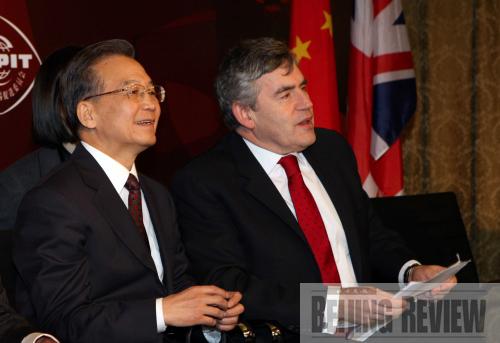 |
|
IN THE SAME BOAT: Chinese Premier Wen Jiabao and British Prime Minister Gordon Brown attend a business summit at the Institute of Directors, London, on February 2. Wen vowed urgent and coordinated action to avert a global economic disaster (YAO DAWEI) |
The British Government released its "The UK and China: A Framework for Engagement" document with considerable fanfare earlier this year, just before Premier Wen Jiabao came to the UK. Prime Minister Gordon Brown and Foreign Secretary David Miliband proudly put their signatures under bold-sounding statements about the UK extracting maximum benefit from its unique relationship with China. Brown's leadership over the response to the banking crisis in late 2008 had won plaudits in China, as had the very fact that the UK had chosen China over all other countries to issue such a document about in the first place. Even so, many might ask exactly where the UK stands with China, a country that is new to the UK in the sense of its recently re-established economic might, but old in the sense that we have known each other, and, because of Hong Kong, talked in great depth and gotten to know each other very profoundly over the last decades.
The UK should be in a good place with China. It has many advantages, from the wide use of the English language in China, to the large number of Chinese students here, long-established relations, a long history of mutual interaction and understanding and an increasingly impressive academic and specialist community in the UK with powerful and extensive knowledge about China. Even so, are we really doing that well? Are we really maximizing the benefits of our relationship with China? Are we really a country that China takes seriously, and should we be if we aren't? The most striking feature of the framework document was that while it was a nice gesture, in terms of substance it offered hardly anything at all. Its outcomes and strategic objectives have been spelled out in many other places over the years. Its articulation of focus is so broad and general as to be literally meaningless. And there is a horrible suspicion that it has been produced within a rubric of international objectives and principles, which, while good in helping bureaucrats achieve their personal "career scores," doesn't help much in looking at the broader picture of how the UK and China, as countries, work with each other in key areas of common strategic interest, and what happens when they disagree. It doesn't take sufficient account of the particularities of China and our present and historical relationship with it. And in many ways, while keen to spell out how to tell China what to do, it does not show much understanding of what the UK might learn from China, nor, for that matter, what the UK actually wants.
Why should the UK want a good relationship with China? In terms of its political system, and many of its social and cultural characteristics, there is nothing but pure difference. For energy, there are ways in which we are competitors. The UK runs huge trade deficits with China. And it regards unguided immigration from China so negatively that it maintains strict controls over the issuing of tourist visas, and has only recently relaxed the regulations for allowing highly skilled Chinese to stay in the UK after graduating from study here. The UK has been critical of China's human rights, its use of the death penalty and its impact on the environment. All of these are legitimate areas of concern. Even so, the general consensus now is that China's economic clout means that it matters greatly, and that preserving good relations with it is in our national interest. No one seriously disputes that. China's integration into the international economy and order is regarded as a good thing. But what, in particular, does the UK as a sovereign state get from this?
How an old enemy became a new friend
One characteristic of the strategic document is its odd combination of being both highly aspirational and complacent at the same time. Great objectives, stated smoothly, of helping China with its environmental and energy and resource problems are pitched so high that they remain way above anything we can look to realistically achieve, at least solely as the UK. The UN and the United States, or even the European Union (EU), will be the drivers of this. Britain will only play a role, possibly just a minor one. What is the specific area where Britain can both contribute and gain?
This brings us to another striking characteristic of the Framework document, and that is its ahistoricity. It reads like China and the UK have only just learned about each other. It gives little acknowledgement of our long shared history, a history of engagement stretching back perhaps longer than any other major Western power. No doubt in a government document this history is not so easy to refer to. The Opium Wars, the ceding of Hong Kong, the battles with each other during the "cultural revolution" (1966-76) and then the epic negotiations from the 1980s onwards over the handover of Hong Kong—all of these have given the UK and China a considerable body of knowledge about each other. It's not that we don't know each other. We know each other perhaps too well. We have to pretend we've only just met. In fact, we've been watching each other for a long time.
This is one of the UK's greatest strategic assets. In Europe, we rank as one of the leading centers of expertise on China. Germany has Heidelberg; France has some experts at the French Institute of International Relations. There are pockets of world-class knowledge, some of it in specific areas, in Sweden, Holland and Italy. But the UK now has some of the most dynamic, exciting and vibrant centers of Chinese studies in the world. Even the United States has been casting envious eyes on us. This is a result of intelligent funding choices and patient building up of departments, programs and expertise. Much of this expertise is not just in Chinese departments, but across the full range of disciplines, from social and political sciences to technical departments.
Highly ironically, while the UK operates well here, in the last few years there is a sense that it has lost focus. This paper sets out to show where this is, why it is and where it can be put right.
Could do better
 |
|
Kerry Brown is Senior Fellow at Chatham House in the Asia Program. He worked in the China Section of the Foreign and Commonwealth Office (FCO) and then served as First Secretary, Beijing, from 2000 to 2003. He is a Committee Member of the British Association of Chinese Studies and the Great Britain China Center, Executive Director of the Liverpool Shanghai Partnership, and Associate of the China Policy Institute at Nottingham University. He is also a member of the Working Group of the Collaboration in Chinese-English Translation Between China International Publishing Group (CIPG) and China Coordination Team, FCO, with Beijing Review as the executive body of the Chinese side. |
It would be fatuous, and untrue, to say that Britain hasn't done many things right in its work with China. The government has put serious effort into the embassy and three consulates on the Chinese mainland and one in Hong Kong, with frequent ministerial visits and a series of initiatives, memoranda of understanding and bilateral announcements. The talking has never been so frequent nor has it led to so many papers and statements. But we now need to be very self-critical about this. What precisely has it all achieved? Do we really, for instance, get the maximum benefit out of all the Chinese students who have come to the UK, or are currently here? Beyond their student fees, which basically fund many of the budget lines of our universities, is there something else we can get from all of this? And do the students who come here really return to China as "ambassadors" of their experience at least of our national cultural, political and social values? Have we really gotten as much as we should have from all the trade delegations, trade promotion work and trade enhancement that we have put so many resources and so much effort into? This is not a matter of saying that we are doing adequately, or even well. The key thing is, when we look at our historic relationship, are we in fact doing as well as we can?
I would say not. In terms of my experience of government relations with China, I think there has been a loss of expertise from within government, with a severe running down of at least the research analyst capacity in London, and a remarkable balkanization of expertise and relations with China. This doesn't denigrate the excellent work done by the people still working in these areas. But they are stretched far beyond what they can reasonably deliver. This might be linked to the larger question of how relegated the Foreign and Commonwealth Office (FCO) has become. The China expertise in the FCO used to be world class. It had a formidable reputation. The FCO valued understanding and knowledge of China. That seems no longer to be the case. The most brutal example of this was the closure of the FCO's Mandarin language training two years ago, and the hiving off of this to schools around London. There doesn't appear to be any active effort to recruit people with China expertise for jobs dealing with China.
.)
 |
|
BEIJING TO LONDON: Visitors at an exhibition on sports fashion designed by university teachers and students from Beijing and London on September 5, 2008 (XINHUA) |
The fact that there are myriad mini-dialogues with China between different parts of government might be good in some ways, and shows how much we talk to each other. But in other ways it is problematic. With a weakened FCO, who is steering all this dialogue? Who is coordinating it? The Whitehall China group is still attempting to coordinate work, but as a consensual entity, it lacks the teeth to really focus on hard objectives and drive them through. There is a good reason why China work needs to be coordinated, which I'll come to a bit later. On the Chinese end, there are clear signs that, whatever the diffraction and complexity of the Chinese Government system, at least on foreign policy it is well coordinated. There is a sense that in specific areas, and in dialogue with foreign countries, someone at the top is in control. In the UK, we don't reciprocate this. That undermines the good work that all of these working-level dialogues set out to achieve.
|
